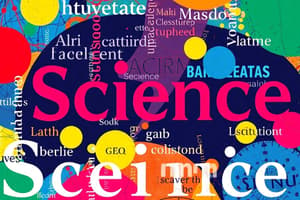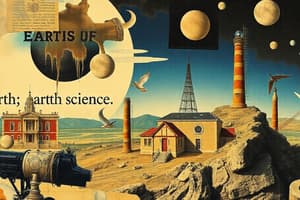Podcast
Questions and Answers
What is bias in scientific experiments?
What is bias in scientific experiments?
- An ethical consideration in research
- A type of variable that does not change
- A standard for comparison in an experiment
- A personal opinion that should be removed from all scientific experiments and observations (correct)
What is a constant in a scientific experiment?
What is a constant in a scientific experiment?
A variable that is designed not to change.
What does control mean in scientific experiments?
What does control mean in scientific experiments?
A standard you can compare your experimental results to.
What is a dependent variable?
What is a dependent variable?
What is Earth Science?
What is Earth Science?
Define ethics in the context of science.
Define ethics in the context of science.
What is a hypothesis?
What is a hypothesis?
What is an independent variable?
What is an independent variable?
What is science?
What is science?
What is a scientific law?
What is a scientific law?
What does scientific method refer to?
What does scientific method refer to?
What is a scientific theory?
What is a scientific theory?
Define technology in the context of science.
Define technology in the context of science.
What is a variable in an experiment?
What is a variable in an experiment?
Flashcards are hidden until you start studying
Study Notes
Key Terms in Science
-
Bias: Personal opinions that must be eliminated from scientific experiments to ensure objectivity.
-
Constant: A factor in an experiment that is kept unchanged to ensure accurate comparisons.
-
Control: A standard reference in experiments for analyzing results, essential for drawing conclusions.
-
Dependent Variable: The measurable outcome in experiments, often expressed quantitatively for later analysis.
-
Earth Science: A field encompassing the study of Earth's materials, processes, and phenomena, including geology, meteorology, and oceanography.
-
Ethics: Principles of morality relating to good and bad, forming the basis for personal beliefs, not testable by scientific methods.
-
Hypothesis: An educated prediction or potential explanation for a problem that can be tested through scientific methods.
-
Independent Variable: The factor altered in an experiment; its variation affects the dependent variable while other factors remain constant.
-
Science: A systematic process involving observation, study, and analysis to expand knowledge about the universe.
-
Scientific Law: A statement that describes natural phenomena's behavior; indicates what occurs without explaining the reasoning behind it.
-
Scientific Method: A structured approach to problem-solving that encompasses defining a problem, researching, hypothesizing, experimenting, data collection, concluding, and retesting.
-
Scientific Theory: A comprehensive explanation of phenomena supported by extensive testing and evidence from multiple experiments.
-
Technology: Practical application of scientific discoveries through tools and systems designed to enhance daily living.
-
Variable: Elements within an experiment that can change; only the independent variable is intentionally manipulated while others are controlled.
Studying That Suits You
Use AI to generate personalized quizzes and flashcards to suit your learning preferences.




